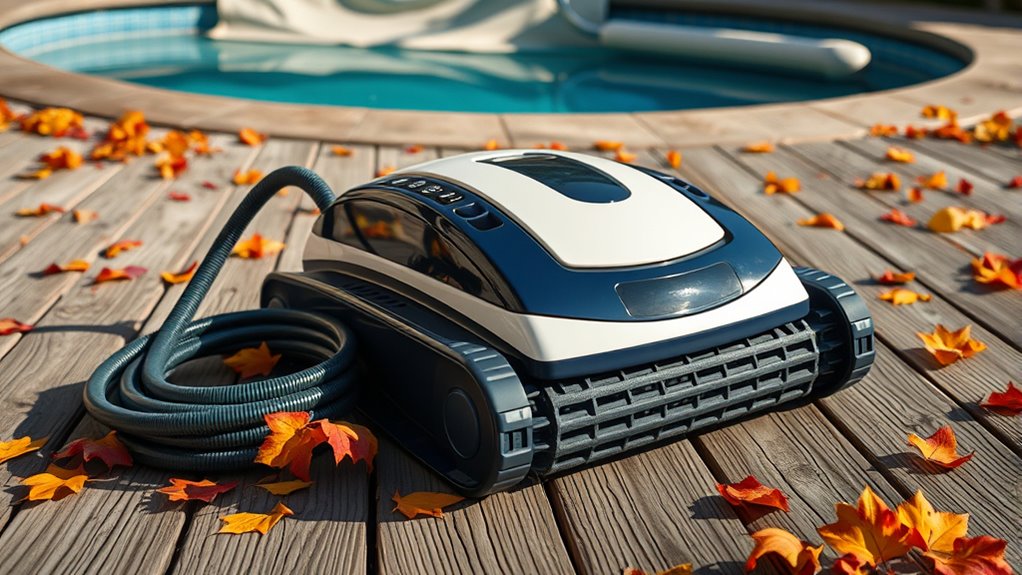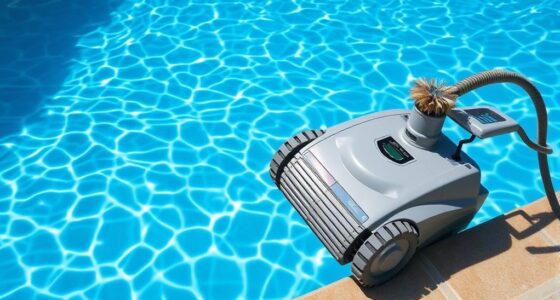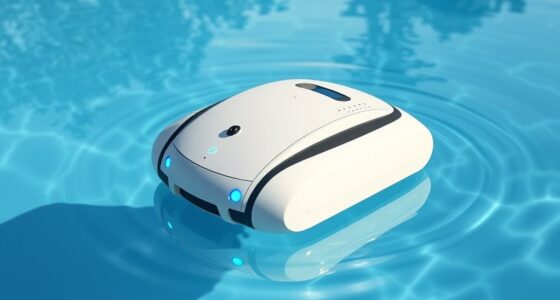To properly store your automatic pool cleaner during off-season, first clean and inspect all parts, removing debris and checking filters, brushes, and wheels for wear. Drain all water from hoses and components, then thoroughly dry and shake off remaining moisture. Store it in a cool, dry, shaded area with good ventilation, preferably in sealed containers. Taking these steps helps prevent damage and guarantees smooth operation when you resume use. Keep going to discover more helpful tips.
Key Takeaways
- Clean and thoroughly inspect the cleaner, including brushes, filters, and brushes, before storage.
- Drain all water from hoses, brushes, and moving parts, then dry completely to prevent mold and corrosion.
- Store in a cool, dry, well-ventilated area away from direct sunlight, pests, and humidity.
- Coil hoses and cords loosely, and organize accessories in labeled, sealed containers for easy access.
- Perform off-season maintenance like running the cleaner briefly, checking chemical levels, and inspecting for damage.
Cleaning and Inspecting Your Pool Cleaner Before Storage

Before storing your pool cleaner for the off-season, you should thoroughly clean and inspect it to guarantee it stays in good condition. Start by removing any debris and rinsing the unit with fresh water to prevent buildup. Pay special attention to filter maintenance; clean or replace filters as needed to ensure top-notch performance next season. Check the brushes and wheels for wear and tear, replacing parts if necessary. Don’t forget to inspect the motor — apply proper motor lubrication to keep it running smoothly. Clearing out dirt and lubricating moving parts reduces the risk of corrosion and mechanical issues during storage. Additionally, ensuring your equipment is well-maintained can help prevent issues related to automation technology during the off-season. A thorough cleaning and inspection now will save you time and money when you’re ready to use your pool cleaner again.
Properly Draining and Drying the Equipment

To prevent mold, corrosion, and damage, it’s vital to properly drain and dry your pool cleaner after cleaning and inspection. Properly drying the equipment enhances winter protection and extends its equipment longevity. Follow these steps:
Properly draining and drying your pool cleaner prevents mold, corrosion, and extends its lifespan.
- Remove excess water from all parts, especially hoses and brushes.
- Shake out or wipe down the cleaner to eliminate residual moisture.
- Store the cleaner in a dry, well-ventilated area to prevent humidity buildup.
- Consider using compressed air to blow out remaining water in hard-to-reach spots.
- Incorporating sound vibrations or gentle sonic cleaning methods can help dislodge any stubborn moisture or debris trapped in small crevices, further safeguarding your equipment. Additionally, inspecting for any signs of corrosion can help address issues early and maintain optimal performance. Using a cleaning solution designed for pool equipment can also help remove mineral deposits and residues that might cause deterioration over time.
Taking these steps ensures your pool cleaner stays in top condition during the off-season and is ready for use when spring arrives. Proper draining and drying are essential for maintaining your equipment’s durability year-round.
Choosing the Ideal Storage Location and Conditions
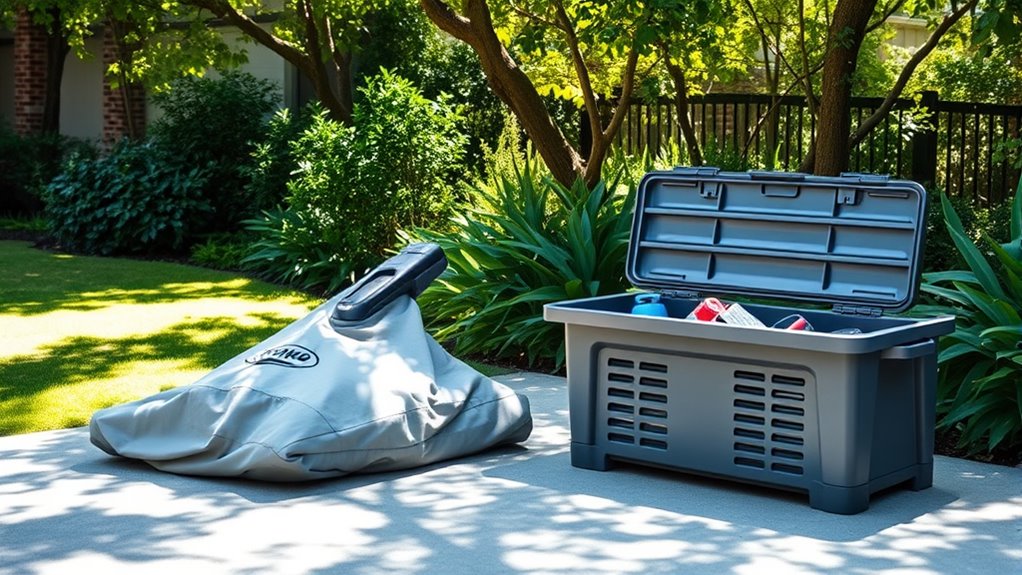
Selecting the right storage location is essential for protecting your pool cleaner during the off-season. Choose a cool, dry area away from direct sunlight to prevent sun damage. An enclosed space prevents pests from nesting or chewing on the equipment. Ensure the spot is well-ventilated to avoid moisture buildup, which can cause mold or corrosion. Consider the following factors:
| Location Feature | Why It Matters | Tips |
|---|---|---|
| Sun Exposure | Prevents UV damage | Store in a shaded area |
| Pest Prevention | Keeps pests from damaging equipment | Use sealed containers or cabinets |
| Ventilation | Reduces moisture buildup | Choose a dry, airy space |
Additionally, maintaining appropriate storage conditions can significantly influence the longevity of your automatic pool cleaner. Proper storage practices are also vital to prevent potential damage caused by environmental factors and to extend the lifespan of your automatic pool cleaner. Proper storage methods can also help maintain the performance of your automatic pool cleaner over time. Ensuring the storage environment is free of humidity helps protect internal components from corrosion and mold. Regularly inspecting the storage area and cleaning the equipment before storing can further prevent issues during the off-season.
Storing Components and Accessories Safely
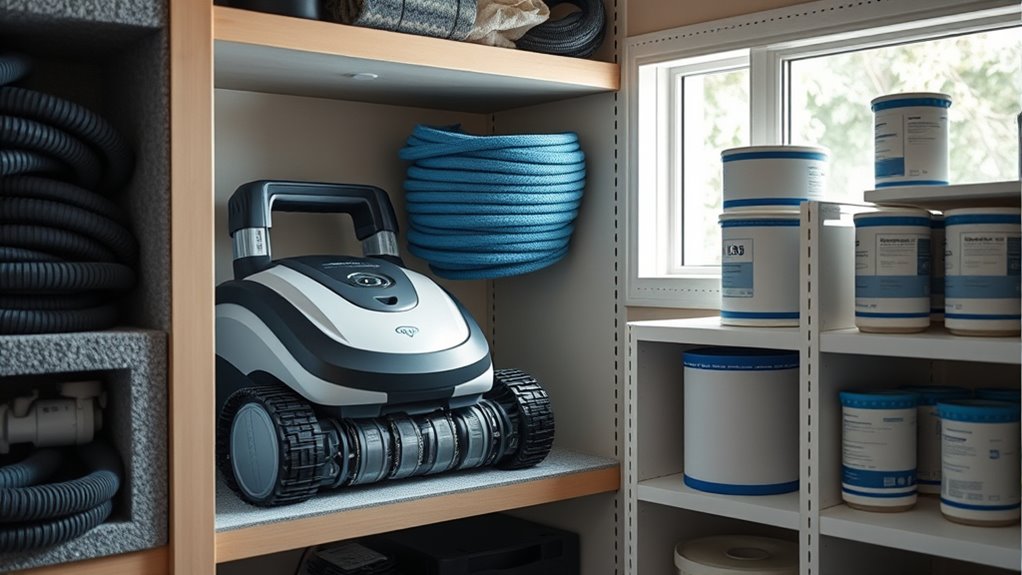
Properly storing your pool cleaner’s components and accessories helps prevent damage and keeps everything ready for next season. To ensure safety and longevity, consider these key points:
- Use storage containers that are chemical compatible to avoid corrosion or degradation of parts. Chemical compatibility is crucial for maintaining the integrity of your equipment over time.
- Opt for clear, labeled bins so you can easily find accessories when needed.
- Keep hoses and cords loosely coiled to prevent kinks and damage. Incorporating proper storage techniques can further reduce the risk of wear and tear.
- Store small parts and filters in sealed containers to protect them from dust and moisture.
- Remember that storage practices can influence the overall durability of your equipment, so choose options that promote safe preservation. Additionally, selecting appropriate storage environments can prevent exposure to humidity and extreme temperatures, which may degrade sensitive components.
- Incorporating proper ventilation in your storage space can also help prevent mold and mildew growth on your equipment. Proper ventilation and controlled environment help extend the lifespan of your pool accessories.
Tips for Maintaining Your Pool Cleaner During the Off-Season

Even when your pool cleaner isn’t in use during the off-season, regular maintenance is essential to keep it in good condition. Start by inspecting your robot vacuum for any debris or damage, and clean its brushes and filters thoroughly. Store it in a cool, dry place to prevent mold or rust. Before shutting down for the season, run the cleaner briefly to ensure it’s functioning properly. Check your pool chemical levels and adjust them accordingly, since improper chemical balance can affect your cleaner’s components. Remove and clean the filter cartridge if applicable. Additionally, reviewing your tanning tips can help protect your skin from damage when you resume outdoor activities. Proper off-season maintenance extends your equipment’s lifespan and keeps it performing at its best, especially considering that indoor air quality can significantly impact the longevity of your equipment when stored improperly. Regularly inspecting filtration systems can help prevent buildup and ensure optimal performance when you start using your cleaner again. Using a proper storage method can also help prevent damage caused by environmental factors during the off-season. Being aware of Dog names can be useful if you have pets that might interfere with your pool area during off-season storage.
Frequently Asked Questions
How Long Can a Pool Cleaner Be Stored Without Damage?
You can typically store your pool cleaner for about 1 to 2 months without risking damage, but longer storage requires proper precautions. To prevent damage, make sure you clean and dry it thoroughly before storage, and avoid exposure to extreme temperatures. Proper storage duration varies based on the cleaner type and conditions. Regularly check it during the off-season to maintain its condition and prevent issues when you use it again.
Are There Specific Cleaning Agents Recommended for Maintenance Before Storage?
Think of your pool cleaner’s maintenance as giving it a gentle spa day before a long rest. Use mild cleaning agents, like a vinegar solution or manufacturer-approved cleaners, to remove dirt and buildup. Follow with thorough rinsing and dry it well. Maintenance tips include checking for wear and lubricating moving parts. This guarantees your cleaner stays in top shape, ready to jump back into action when the season calls.
Can I Store My Pool Cleaner Outdoors During Winter?
You can store your pool cleaner outdoors during winter, but it’s not ideal without proper winter protection. To prevent damage from the elements, make certain you place it in a sheltered area, like under a covered patio or shed. Outdoor storage exposes your cleaner to moisture and freezing temperatures, which can harm its components. For better durability, consider indoor storage or at least provide winter protection to keep it in good shape.
What Are Signs of Damage to Look for During Inspection?
During your damage assessment, look for cracks, leaks, or worn brushes on your pool cleaner. Use an inspection checklist to make certain all parts, like the power cord and brushes, are intact and functioning properly. Check for any signs of corrosion or rust, especially around joints and moving parts. If you notice damage, address it promptly to prevent further issues and ensure your cleaner’s readiness for next season.
How Often Should I Check the Stored Cleaner During Off-Season?
You should check your stored cleaner at least once a month during the off-season. Regular storage frequency helps you catch any issues early, guaranteeing the device remains in good condition. Use inspection timing to look for signs of wear, damage, or mold. By maintaining a consistent schedule, you prevent problems from worsening and ensure your cleaner is ready to go when the swimming season resumes.
Conclusion
By following these storage tips, you’ll keep your pool cleaner in top shape for next season. It’s funny how a simple drain and dry can prevent costly repairs, saving you time and money down the line. When you choose the right spot and handle your accessories carefully, you’re not just storing equipment—you’re ensuring it’s ready to go when the sun shines again. Proper off-season storage truly makes all the difference in maintaining your pool cleaner’s performance.
